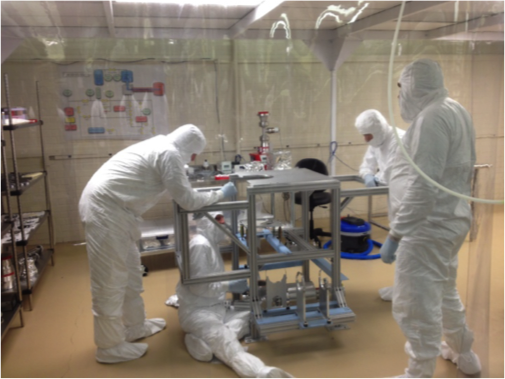Programs Of Study
Undergraduate Major Options
Our bachelor’s degree recipients go on to follow many different paths including further studies in physics and other areas of science and engineering, teaching careers at all levels, and positions in the private sector wherever analytical, computational, and problem-solving skills are highly valued.
The UNC Physics and Astronomy offers two B.S. degree options and six B.A. degree options or tracks. These degree tracks begin with a common set of courses, followed by a selection of additional option-specific courses.
- Physics
- Astrophysics
These B.S. tracks give a thorough grounding in Physics and are aimed at students that intend to pursue graduate study in physics, astronomy, or a related field, or pursue a career where you are doing physics. Our B.S. students take many upper-division physics courses and are required to spend a minimum of one semester performing independent research under the mentorship of one of our faculty members.
- Physics
- Astronomy
- Computational Physics
- Energy
- Medical and Biological Physics
- Quantitative Finance
In addition to core physics and math requirements, students take additional courses from the computer science department, business school, or other departments on campus. See the course catalog for full program information.
These BA options are designed to allow flexibility for students interested in physics and allow a student to use their physics training for a wide variety of career paths after graduation. Students who completed this program have entered full-time employment as a lab technician, application engineer, data scientist, financial analysis, or pursued an advanced degree in physics, medical physics, business, or computer science.
Undergraduate Minor Options
If you are majoring in a different field but wish to take more quantitative physics courses that can serve you well for your future career goals, or if you began work toward a Physics B.A. or B.S. but found your interests shifting in another direction, completing a minor in Physics may be a natural choice. The UNC Physics and Astronomy department offers two options for completing a Physics Minor:

Frequently Asked Questions for Incoming and Current Students
I am a prospective student and I am interested in speaking with someone in the Department of Physics and Astronomy about the undergraduate program. Who should I contact?
You can contact our department’s Director of Undergraduate Studies, Tamara Branca (rtbranca@physics.unc.edu).
Can I get credit from AP exams?
Not for major/minor requirements (see AP credit page for UNC credit awarded), but this is possible by taking our placement exams.
How do I join the honors program?
If you wish to enter the honors program, you should consult with the departmental coordinator for the program no later than the preregistration period in the spring semester of your junior year.
What is the Interdisciplinary Studies Major?
This is a B.A. major for students who wish to develop a major outside those offered by the departments and curricula in the College of Arts and Sciences. The major consists of eight courses, chosen from at least three departments. Typical choices for physics courses include PHYS118, PHYS119, PHYS281L, and PHYS331. More information can be found at http://curricula.unc.edu/students/interdisciplinary-studies/
What if I can’t finish my degree in four years?
Discuss this with your physics advisor ASAP. Options may exist to help you (B.A. vs. B.S., petitioning for a 9th semester, APS Bridge Programs for under-represented students, etc.)
What if I’m transferring from another university?
Please consult the standard requirements above along with your Tar Heel Tracker. Information about your transfer credit can be found here. Consult your academic and physics/astronomy advisor to ensure that you’re on the right track. We’re here to help you succeed!
How do I become more involved in the department?
There are many ways that you can integrate into department life. Attending weekly colloquia, participating in department research, and joining student organizations such as the Society of Physics Students or Visibility in Physics are all great ways to get involved.
Where can I find a list of the physics advisors?
You can find a list of Department advisors here.
Contact Information
General questions about our program can be directed to either Jacob Hurst (hurstj@unc.edu ), our Academic Affairs Coordinator, or Tamara Branca (rtbranca@physics.unc.edu), our Director of Undergraduate Studies.

